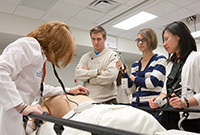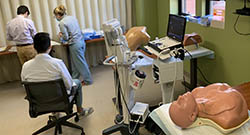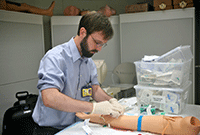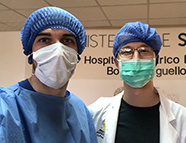
The Internal Medicine Residency Program at Michigan Medicine is among the top programs for post-graduate medical training. In addition to excellent clinical experiences, our residents participate in an innovative curriculum that augments clinical training.
Ambulatory Care
The majority of medical care occurs in the ambulatory setting. As a result, internists must be comfortable evaluating and managing both acute complaints and chronic conditions outside the hospital.
A goal of the University of Michigan Internal Medicine Residency Program is that all our graduates will be comfortable with the practice of general internal medicine in the outpatient setting. While some of our residents will elect to pursue further training after residency in subspecialty practice, we believe these core skills in outpatient general medicine will serve them well in aspects of their future practice and in their overall development as internists.
Outpatient Clinical Experiences
Our residents gain clinical experience in the practice of Internal Medicine in the outpatient setting through three main rotations or longitudinal experiences:
- Continuity Clinics
- Ambulatory Block Rotations
- Outpatient Clinical Electives
- Continuity Clinics
On average, residents are scheduled for one half day of continuity clinic per week with additional time in their assigned clinic during their ambulatory block rotations. All residents:
- participate in an “immersion week” in clinic early in their training to improve comfort in their clinic setting.gain experience from patient encounters with guidance from expert clinician-educator and research-based general internal medicine faculty.
- benefit by direct observation of clinical and communication skills.
- take part in monthly outpatient teaching sessions with your continuity clinic faculty.
Ambulatory Block Rotation
All residents participate in ambulatory block rotations as part of their outpatient training. The rotation is a 4-week outpatient rotation made up of both primary care and subspecialty clinics. The experience involves extra time in residents’ own continuity clinics to build their patient panel as well as a variety of medicine and non-medicine clinics (dermatology, gynecology, ophthalmology, and neurology). Residents have an “academic half-day” during this rotation during which they receive high-yield didactics from a variety of faculty.
Upon successful completion of these rotations, residents will be able to diagnose and manage a wide range of acute and chronic internal medicine disease states. Residents will understand the logistics of care in the ambulatory setting and have the ability to work in a variety of practice environments. They will also be familiar with the care of a variety of patient populations in the ambulatory setting.
This rotation is mandatory for residents at all house officer levels. All interns will complete at least one ambulatory block rotation (primary care track residents may have the opportunity for two rotations). Senior residents will complete one to two ambulatory block rotations per year with additional outpatient training opportunities for residents participating in the primary care track.
Teaching to Teach
Residents have several opportunities to hone skills in medical education during residency. Throughout the year there are several academic half day sessions devoted to teaching high-yield topics in medical education, including developing teaching scripts, giving feedback, and effective lecture techniques.
Senior residents may also elect to participate in the medical education outpatient elective. During this experience, residents participate in several teaching experiences, including Sub-I report, VA chief rounds, and VA physical exam rounds. The residents also develop several teaching scripts during this rotation which they can use to enhance their teaching on inpatient rotations.
Inpatient Care
On Inpatient Services, our residents not only experience the unique patient care within a state-of-the-art tertiary care center like the Michigan Medicine Hospital but will also spend time in the Ann Arbor Veterans Affairs (VA) Hospital which complements the clinical experience tremendously.
Inpatient Service Model
Guiding Principle: The optimal inpatient experience includes specialty experiences balanced with general medicine and critical care exposure.
Maximize Time for Education
- Resident assistant program - Designed to help teams with non-medical patient care tasks. At the University Hospital, each service has a resident assistant that performs clerical and other support tasks for the team. At the Ann Arbor Veterans Affairs Hospital, a care coordinator rounds with each team to assist with similar support tasks with a focus on optimizing transitions of care to the outpatient setting.
- Inpatient service caps designed around education - Each intern’s census is capped at a maximum of eight patients at the University Hospital and VA. Intern admissions are capped at five per long admitting day or night shift. Senior admission and team census caps are in place as well.
- Subspecialty services - In addition to General Medicine services, residents at the University Hospital rotate on the Cardiology, Gastroenterology/Hepatology, and Hematology/Oncology inpatient services, which offer opportunities to work directly with fellows and attendings in these fields daily.
- Duty hours – There is an excellent culture of sign out at the hospital, allowing residents to leave when their work for the day is completed and the late call team can appropriately cross-cover the patients. Services are carefully monitored to ensure that ACGME work hours are met, though most residents tend to be well under the limit.
- Overnight coverage – Apart from a single 24 hour call on Saturday at the VA MICU, all services have dedicated night float coverage. The night float teams are themselves relieved once per week by residents on consult or ambulatory rotations (which account for about four weekend nights per year per resident).
Inpatient Rotation Overviews
General Medicine
There are three separate resident-based general medicine teaching services. The vast majority of these are staffed by attending faculty who at other times of the year provide direct patient care in their role as hospitalists at Michigan or the Ann Arbor VA. This structure provides residents with teaching by faculty who are accustomed to the daily experience of being the first contact caring for complex inpatients.
- Hospital General Medicine: These are the traditional general medicine services that care for a broad variety of patients and medical conditions. Teams are comprised of an attending as well as one senior resident, two interns, and zero to two medical students. Teams are on call every other day, alternating between early call (admit 6 total) and late call (admit four total). Teams can sign out to the late call team once their work is done in the mid-afternoon. In addition, the late call team carries the code pager for the hospital. Two-night float senior residents split the cross cover for the four teams overnight from 7pm to 7am and admit two to five patients each night.
- VA General Medicine: There are no medicine subspecialty primary services at the VA; as such, the VA general medicine services manage a broad variety of inpatients and conditions. This is a highly teaching-oriented service aimed at providing a smaller hospital experience to the trainees. Teams are comprised of an attending as well as one senior resident, two to three interns, and three to four medical students. Teams are on call every other day, alternating between early call (admit six total) and late call (admit five total). Faculty who round at the VA tend to work at both the University and the VA. The call cycle is similar to UH General Medicine. There is a faculty nocturnist and a senior resident who split the cross cover of the four teams overnight from 7pm to 7am.
- Hospitalist: This is a two-week rotation where senior residents can work in a role that is similar to a future career as a hospitalist. During the “inpatient” week, a senior resident is paired with a hospitalist and manages a list of up to 10 patients each for a week at a time. There are no interns or medical students on this rotation, and the residents do not perform admissions during this week. On the “admitting” week, the residents have afternoon admitting shifts, continuity clinic, and ample time off. There are two Newburgh teams working at any given time which allows for the teams to sign out to one another every other day. The service is covered by an advanced practice provider overnight with on-site nocturnist faculty supervision.
Cardiology
Residents rotate on the General Cardiology service as both interns and senior residents. These are busy services with a high degree of turnover, designed to maximize the educational experience for both general internists and those interested in pursuing a career in Cardiology. Residents manage conditions such as acute coronary syndrome, decompensated heart failure, atrial and ventricular arrhythmias, pulmonary hypertension, valvular disease, adult congenital heart disease, endocarditis, and much more. There is ample teaching, ranging from interpreting EKGs, echocardiography, and coronary angiograms to understanding the evidence behind major guidelines. The General Cardiology service is divided into four teams that each consist of an attending cardiologist, 1 senior residents, 2 interns, and 0-2 medical students. Teams are on call every other day, alternating between early call (admit 8 total) and early call (admit 6 total). Teams can sign out to the late call team once their work is done in the mid-afternoon. In addition, the late call team carries the code pager for the hospital (in conjunction with the late call General Medicine team). Three residents (2 seniors and 1 intern) cover the four teams overnight from 8pm to 7am and admit up to 10 patients collectively.
Gastroenterology/Liver
Residents rotate on the Gastroenterology/Liver (“GIL”) service as an intern and have the option to do so as a senior resident. These complex subspecialty services have two attendings: (1) a gastroenterologist who is the attending of record for patients with pancreatic disease, inflammatory bowel disease, and complex biliary disease as well as (2) a transplant hepatologist who is the attending of record for patients with advanced liver disease/cirrhosis and patients admitted following a liver transplant. Residents are exposed to a broad variety of care, including modern biologic therapy for IBD, transplant-related complications, immunosuppression, infection, decompensated cirrhosis, gastrointestinal bleeds, and much more. Two teams, each composed of one senior resident, two interns, and zero to two medical students, round with both attending faculty daily and admit new patients every other day, although only the senior resident and one of the interns stays all day. A senior resident and an intern cover the two teams overnight from 8pm to 7am and admit up to five patients.
Hematology/Oncology
Residents rotate on the Heme/Onc service as interns and have the option to do so as a senior resident. The Hematology portion of the service primarily cares for patients with acute leukemias and other liquid malignancies as they undergo induction chemotherapy, though a variety of other conditions are managed, including aplastic anemia, neutropenic fever, and patients admitted for complications of chemotherapy. The Oncology portion of the service cares for patients with solid tumors who are admitted with complications of their malignancy or treatment that would be best suited to having an oncologist as the inpatient attending of record. Teaching on this service is focused on appropriate diagnostic workup for malignancy, interval staging and screening, principles of cancer treatment, complications of chemotherapy and immunotherapy, and management of oncologic emergencies (tumor lysis syndrome, spinal cord compression, hypercalcemia). Two teams, each composed of one senior resident, two interns, and zero to two medical students, round with both the Hematology and Oncology faculty members, along with a Hematology fellow and a dedicated pharmacist for each service. The teams each admit new patients every other day, although only the senior resident and one of the interns stays all day. A senior resident and an intern cover the two teams overnight from 7pm to 7am and admit up to five patients.
Critical Care Medicine
The Critical Care Medical Unit (CCMU) at Michigan Medicine is a 20-bed closed unit divided into four teams each composed of a senior resident and an intern. Residents take care of the some of the sickest patients in the hospital. Teaching sessions are focused on the conditions that commonly seen and managed, including circulatory shock, respiratory failure and mechanical ventilation, kidney failure, and all other aspects of critical care. Residents perform commonly needed bedside procedures for their patients, including but not limited to arterial line placement, central venous catheterization, acute hemodialysis catheter placement, paracentesis, and thoracentesis Dedicated procedural supervision is provided by faculty, fellows, and senior residents. Residents are also responsible for leading family meetings and coordinating complex goals of care discussions.
Cardiac Critical Care
The Cardiac ICU is a 10-bed closed unit divided into two teams, each composed of a senior resident and an intern, along with a dedicated faculty cardiologist (typically either an Interventional Cardiologist or Heart Failure/Transplant subspecialist) and cardiology fellow. Conditions commonly seen in the CCU include cardiogenic shock, ST-segment elevation myocardial infarction, cardiac tamponade, ventricular tachycardia, and high-grade heart block. Residents gain exposure to advanced mechanical circulatory support and electrophysiologic procedures. Residents perform arterial line placement and central venous catheterization routinely. Teams alternate staying until 8pm daily. One senior resident along with an in-house cardiology fellow covers the service overnight from 8pm to 7am.
VA Medical ICU
Residents rotate through the MICU at the VA only as second- and third-year residents. There are three residents who round daily along with a faculty intensivist and pulmonary/critical care fellow. The VA MICU is a smaller unit than the CCMU; as there is no cardiology ICU at the VA, residents will take care of both medicine and cardiology critical care patients. Residents do all procedures at the VA in the same fashion that they would at the University. One of the three residents stays until 8pm daily. One senior resident covers the service overnight from 8pm to 7am, except on Saturdays when a day resident stays for a 24-hour call.
Clinical Simulation



As part of our residents’ education and training, we have access to a state-of-the-art Clinical Simulation Center. Here our residents learn and practice procedural skills including aseptic technique, venous cannulation (peripheral and central), interosseous vascular access, thoracentesis and intubation. These resources allow for individual and team-based training to reinforce concepts presented in Advanced Cardiac Life Support (ACLS) and include monthly refresher sessions with a “Mock Code“ for those assigned to the code team. Additionally, within our ambulatory curriculum we utilize tools such as the ophthalmology simulators to review the eye exam, provide feedback on technique, and discuss identified pathology and documentation. Coupled with “real world” experiences, our program incorporates the use of simulation technology to ensure the best delivery of healthcare to our patients under any circumstances.
Service and Rotation Opportunities



Our residents have many opportunities to volunteer their time and expertise in the community and beyond.
Clinical experiences for the underserved include:
- ACT Rotation - Ann Arbor, MI - Residents can elect to rotate on this consult service at Michigan Medicine University Hospital where they will work with a team of addiction boarded providers, including MDs and SWs, to provide care for patients with substance use disorder admitted to the hospital.
- Chass Clinic - Detroit, MI - Serves a predominantly Spanish speaking population as a patient centered medical home, with behavioral/mental health, dietary counseling, and social work. Available as a part of an underserved or custom rotation.
- Delonis Clinic - Ann Arbor, MI - Serves the homeless population residing in the Delonis shelter. Operates once per week and can be part of an underserved rotation or other custom rotation.
- Hamilton Clinic - Flint, MI - Federally qualified health center (FQHC) dedicated to providing community-oriented care for patients throughout Genesee and Lapeer Counties. Our residents have been rotating at the Flint location for three years and see a variety of patients in the general medicine clinic.
- Hope Clinic - Westland, MI - Has been in operation as an FQHC since 1982. Our residents currently rotate at the Westland location. This site has the opportunity to be a second continuity clinic site for a primary care track resident who is interested, starting in their second year.
- Packard Health - Ann Arbor, MI - FQHC offering health care services to people who are uninsured, isolated, and medically vulnerable. A patient centered medical home. Our residents have been rotating there for several years, and we are looking forward to their new expanded location opening up later next year.
- Women's Correctional Facility - Ypsilanti, MI - The only women’s prison in the state of MI, with over 2,000 incarcerated women. Their medical operations span from managing acute concerns to chronic disease.
Volunteer opportunities include:
- University of Michigan Student Run Free Clinic, Ypsilanti, MI
- Wolverine Street of Medicine, Detroit, MI
- Migrant Farm Clinic, Ann Arbor, MI
- Food Gatherers, Ann Arbor, MI
Rotation Opportunities
Residents can take part in a number of away rotations. These include experiences across the United States to enhance one’s rural medicine exposure and international rotations for those interested in global health.
Goals and Benefits
- Compliment your residency experience
- Facilitate career decisions/planning
- Strengthen diagnostic skills
- Shift dependency on diagnostic tests
- Build further sense of global health needs
- Provide service to a community in need
- Gain a potentially “life altering experience”
Patient Safety and Quality Improvement
The Department of Internal Medicine's Clinical Experience and Quality partners with the residency program to expose residents to patient safety and quality improvement (PS/QI) across all three years of residency.
Year one focuses on exposure and awareness, with several foundational PS/QI seminars. During the second year, teams of four to five residents apply their PS/QI knowledge to a month-long quality improvement project. The teams are led by the department’s PS/QI faculty mentors and the Q&I Program’s performance improvement coaches who facilitate topic selection, introduce quality improvement tools, and provide support for data needs and the presentation of project outcomes. In year three, residents can choose to deepen their understanding by leading or participating in additional QI projects, serving on a variety of QI committees, or pursuing an elective with a faculty mentor. Seven faculty from a variety of divisions serve as faculty mentors to residents during their second year PS/QI projects.
Award & Recognition Opportunities
- Resident PS/QI Project Challenge - The Resident PS/QI Project Challenge was created to recognize outstanding resident teams during their Patient Safety and Quality Improvement project rotation.
- Resident Travel Award - Residents who plan to present original clinical quality improvement work (usually in the form of an oral presentation or poster) at a regional, national, or international meeting may apply for a travel grant from the Department of Internal Medicine
Conferences and Lectures
Departmental Grand Rounds - Occurs each Friday at noon and features state-of-the-art lectures on topics relevant to internal medicine with a focus on recent scientific advances. The last Friday of each month is dedicated to Morbidity & Mortality conference led by our chief medical residents.
Morning Report - Occurs three-four mornings each week and includes a case-based discussion led by a chief medical resident with a faculty discussion present to offer clinical pearls. Morning report is streamed via Zoom with the option to watch in-person for residents at University Hospital and VA Ann Arbor Healthcare System, where coffee and snacks are provided.
Intern Bootcamp - Occurs one-two times weekly during the lunch hour. Senior residents present on foundational internal medicine topics (e.g. Decompensated Cirrhosis, Altered Mental Status, Outpatient Diabetes Management).
Special Conferences - Occurs each Thursday and features a rotation of special topics including:
- Global Health Equity rounds
- Patient Safety & Quality conference
- Multidisciplinary Critical Care didactics
- Compassion & Wellness rounds
Ambulatory Morning Report - Occurs four times weekly from 7:30-8:30am (before clinic) for all residents on their Ambulatory rotation. Residents present on high-yield primary care and ambulatory topics (e.g. Approach to Hypercalcemia, Diagnosing Tick-Borne Illness, Interpreting PFTs) with the guidance of an expert faculty discussant.
Thursday Learning Session (TLS) - Occurs Thursday afternoon for residents on their Ambulatory rotation and covers a variety of non-clinical topics including the Teaching to Teach series, Evidence-Based Medicine, Addressing Discrimination & Microagressions, and Vital Talks - Managing Difficult Conversations.




